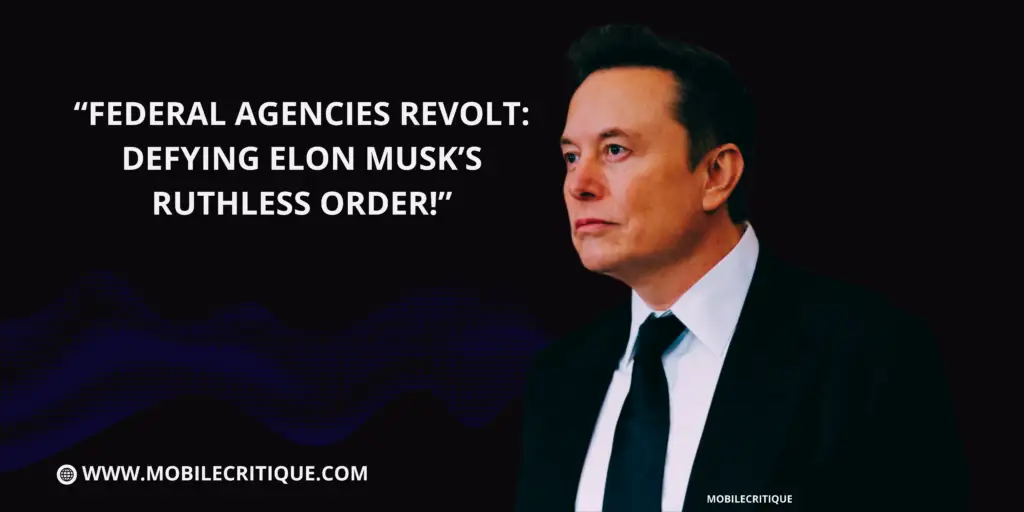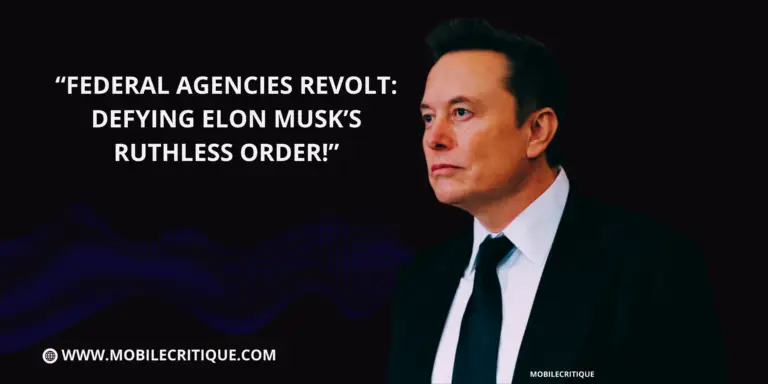
“Federal Agencies Revolt: Defying Elon Musk’s Ruthless Order!”
Overview
Federal agencies and employees are scrambling to respond to Elon Musk’s recent directive requiring federal workers to reply to an email detailing their work over the past week—or face termination. Multiple agencies have advised employees not to respond as the Monday deadline approaches.
Timeline of Events
• February 23, 3:26 PM EST – The American Federation of Government Employees (AFGE), the largest union representing federal workers, sent a letter to the Office of Personnel Management (OPM) condemning Musk’s directive as “plainly unlawful.” The union argued that there is no legal basis for requiring employees to comply and criticized OPM for diverting workers from essential duties.
• February 23 – The Department of Defense and the federal judiciary joined other agencies in instructing employees not to respond. According to reports, Tulsi Gabbard, head of the Office of the Director of National Intelligence (ODNI), advised her staff not to engage, citing security concerns over classified information.
• February 23, 8:45 AM EST – Musk defended his directive on X (formerly Twitter), claiming it was a “very basic pulse check.” He asserted that it was necessary to verify whether nonexistent or deceased individuals were fraudulently collecting salaries—without providing any supporting evidence.
• February 22 – Reports emerged that several agencies, including the State Department, FBI, and certain divisions of the Justice Department, instructed employees not to comply. FBI Director Kash Patel told employees to “pause” their responses, emphasizing that the agency handles its own review processes.
• February 22 – Federal employees received an email with the subject line, “What did you do last week?” The Wall Street Journal reported that Musk and his team initially conceived the idea and sent it to OPM, which then distributed it to roughly two million workers.
• February 22, 2:46 PM EST – Musk posted on X that “in compliance with [President Donald Trump’s] instructions, all federal employees will shortly receive an email requesting to understand what they got done last week,” adding, “Failure to respond will be taken as a resignation.”
• February 22, 8:04 AM EST – Trump expressed support for Musk’s initiative on Truth Social, stating, “Musk IS DOING A GREAT JOB, BUT I WOULD LIKE TO SEE HIM GET MORE AGGRESSIVE.”
Agencies Instructing Employees Not to Respond
High-ranking officials at several agencies have directed employees not to reply to Musk’s email, including:
• Federal Bureau of Investigation (FBI)
• Department of Health and Human Services (HHS)
• Department of Defense (DoD)
• Office of the Director of National Intelligence (ODNI)
• U.S. Courts System
• State Department
• Department of Justice (DOJ)
Additionally, employees at the National Oceanic and Atmospheric Administration (NOAA) were advised to refrain from responding while the agency assessed whether the email was a phishing attempt. The National Science Foundation (NSF) informed employees that it was seeking further guidance. Meanwhile, parts of NASA initially told staff to respond but later instructed them to draft a reply without sending it until further notice.
Agencies Directing Employees to Respond
While Musk claimed he received “a large number of good responses” from federal workers, it is unclear which agencies complied. Reports indicate that:
• The Cybersecurity and Infrastructure Security Agency (CISA) and Secret Service instructed workers to respond. Secret Service employees submitted a template response stating:
“This week I accomplished: 100% of the tasks and duties required of me by my position description.”
• The Natural Resources Conservation Service (NRCS) told employees to comply, emphasizing the importance of showcasing their work.
• The Justice Department provided mixed guidance. While multiple high-level officials advised against responding, a DOJ spokesperson reportedly contradicted this, stating, “The opposite is true—DOJ has sent guidance that employees should respond.”
• Ed Martin, U.S. Attorney in Washington, D.C., initially encouraged employees to comply but later revised his stance, stating that employees could choose whether to respond.
Republican Reactions to Musk’s Directive
While most Democratic lawmakers have condemned Musk’s directive, even some Republicans have voiced concerns:
• Rep. Mike Lawler (R-NY) questioned the feasibility of firing federal employees who fail to respond, citing union protections.
• Sen. John Curtis (R-UT) urged Musk to show “compassion,” emphasizing that federal workers are real people with livelihoods at stake.
Can Musk Fire Federal Employees for Noncompliance?
It remains uncertain what actions, if any, will be taken against employees who do not comply. Given OPM’s recent staff reductions, the agency may struggle to process responses efficiently. If Musk attempts to terminate non-responders, legal challenges from unions and employees are likely. The AFGE has already pledged to fight any unlawful dismissals.
Contradictions in Musk’s Authority
Musk’s directive contradicts the Trump administration’s legal stance. While Trump has publicly encouraged Musk’s involvement, administration lawyers have downplayed his authority in court. A coalition of Democratic attorneys general has challenged Musk’s influence over the federal government, calling him an “agent of chaos.” The administration has repeatedly argued that Musk lacks formal decision-making power and is not an employee of the Department of Government Efficiency (DOGE)—the agency Trump appointed him to lead.
Background on Musk’s Federal Workforce Overhaul
Musk’s initiative is part of a broader effort by his DOGE office to cut federal spending and reduce government waste. This has led to mass layoffs—some of which were later reversed—and voluntary resignation incentives for federal employees. DOGE has also faced criticism for attempting to access sensitive government information and has been the subject of multiple lawsuits challenging its authority.



